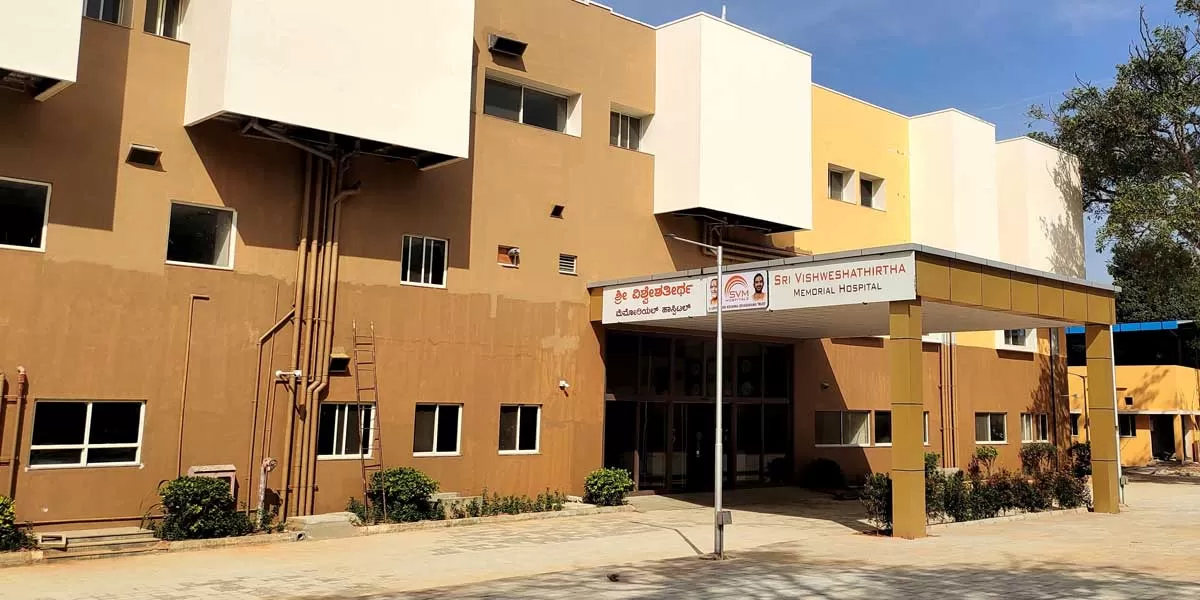Union Home Minister and Minister of Cooperation, Shri Amit Shah, today inaugurated the Sri Vishweshathirtha Memorial Hospital in Bengaluru, Karnataka. The 150-bed multi-speciality hospital, constructed on a two-acre site at a cost of Rs 600 million, is dedicated to providing free healthcare services to the underprivileged. Shri Shah emphasised that 60 per cent of the hospital’s beds have been reserved for those in need, ensuring that quality medical care reaches the poorest sections of society.
Highlighting the philanthropic efforts behind the initiative, Shri Shah praised the Sri Krishna Seva Ashram Trust for its unwavering commitment to public service. Founded by Sri Vishweshathirtha Swamiji, the trust has long been engaged in healthcare and welfare initiatives. His successor, Sri Vishwaprasannteerth Swamiji, continues this legacy, having established the Sri Krishna Medical Centre, Sri Krishna Netralaya, Dental Centre, and Sri Vishwaprasannteerth Memorial Clinic. Shri Shah affirmed that this hospital will serve as a beacon of hope for those in need and will remain an integral part of Bengaluru’s healthcare landscape for years to come.
Pejawar Mutt’s Enduring Legacy in Social and Religious Service
Speaking at the event, Shri Amit Shah highlighted the Pejawar Mutt’s historic role in Karnataka and across India. Under the visionary leadership of Sri Vishweshathirtha Swamiji, the Pejawar Mutt became an institution of national significance, known for its promotion of Hindu unity, opposition to forced conversions, support for the Ram Mandir movement, and unwavering service to Hindutva and Sanatan Dharma.
Shri Shah noted that Sri Vishweshathirtha Swamiji was a spiritual luminary, who took sanyas at the age of eight and dedicated his life to the service of religion, society, and the nation. His contributions were recognised at the highest level when Prime Minister Narendra Modi conferred upon him the Padma Vibhushan in 2020. Shri Shah further remarked that Swamiji worked tirelessly to unite Hindu society, break caste barriers, and promote education, healthcare, and Vedic learning.
The Pejawar Mutt has played a significant role in guiding devotees on the path of devotion to Lord Krishna, following the teachings of Sri Madhvacharya. The mutt has also been instrumental in the religious ceremonies of Lord Ram’s consecration at the Ram Mandir, reaffirming its commitment to spiritual and national causes.
Healthcare Initiatives Aligned with National Welfare Programmes
During his address, Shri Shah reiterated the Modi government’s strong emphasis on public health and wellness over the past decade. He highlighted flagship initiatives such as:
Swachh Bharat Abhiyan – promoting sanitation and hygiene
Fit India Movement – encouraging a healthier lifestyle
Nutrition Mission – addressing malnutrition across India
Mission Indradhanush – ensuring universal vaccination coverage
Ayushman Bharat Yojana – providing free healthcare up to ?5 lakh for 60 crore people
Jal Jeevan Mission – delivering clean, fluoride-free water to households
Shri Shah emphasised that religious and service-oriented institutions play a crucial role in supporting these health initiatives. He expressed confidence that the Sri Vishweshathirtha Memorial Hospital will not only provide world-class healthcare but also actively promote these welfare schemes, making a tangible difference in people’s lives.
A Transforming Healthcare Landscape
The inauguration of the Sri Vishweshathirtha Memorial Hospital underscores a broader trend of expanding healthcare infrastructure in India. With increasing government support, private and religious institutions are playing an active role in bridging healthcare gaps, particularly for economically weaker sections.
The Indian healthcare sector is witnessing rapid transformation, driven by technological advancements, policy reforms, and increased public-private partnerships. The rise of multi-speciality hospitals, especially in semi-urban and rural areas, is ensuring that quality medical care is accessible to all. With continued government initiatives and philanthropic contributions, the country is moving towards a more inclusive and robust healthcare ecosystem.
The Sri Vishweshathirtha Memorial Hospital stands as a testament to this progress, offering state-of-the-art facilities, compassionate care, and a commitment to social welfare, reinforcing India’s journey towards a healthier and more equitable society.





















